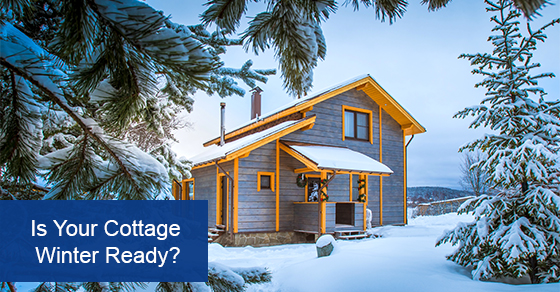
Is Your Cottage Winter Ready?
Posted by on Nov 02, 2020 in
With travel options being quite limited these days, you’ve probably become very popular as a cottage owner. But as with all good things, summer has come to an end. That means that it’s time to start thinking about getting your cottage ready for winter. Whether you still use your cottage during the winter or completely shut it down, it’s essential to make sure that you take all the necessary steps to protect your cabin during the fierce Ottawa winters. Here are some steps you can take to help prevent any issues with your cottage over the winter:
- Get your boat ready for winter.
- Make your cottage ‘animal-proof.’
- Set up your water and heating systems appropriately.
- Check the state of your roof to make sure there are no significant issues with it.
- Confirm all the trees on your property are in good shape and trim them as necessary.
Get Your Boat Ready for Winter
Regardless of whether your cottage is winterized or not, it’s unlikely that you’ll be using your boat over the winter season. It’s essential to get your boat all ready for winter by:- Making sure it’s clean, which will prevent it from deteriorating over the winter.
- Flushing the engine to prevent blockages. Also, add a fuel stabilizer to the fuel tank.
- Covering your boat with a tarp or, even better, shrink wrapping it, which will prevent any animals from making their homes in it.
Keep Animals From Making Your Cottage Their New Winter Home
. Unless you plan to spend a lot of time at your cottage this winter, go through all your cupboards and your fridge and get rid of any food. Leaving food in your house will attract all kinds of animals. The last thing you want to do is come back to your cottage in the spring to find out mice have been living in it! Check your cottage for any areas animals could get in. Don’t underestimate how determined a raccoon can be. Block any sites that an animal could use to get into your cottage. A chimney cap will help prevent animals from using your chimney to enter your cabin.Get your Water and Heating Systems All Set
If your cottage is winterized, you may want to leave your water and heating systems as is. If your house is not winterized, however, you should:- Drain and then shut down your water systems to prevent pipes from bursting.
- Unplug any major appliances that will not be in use.
- Have your septic tank and sump pump serviced to avoid any nasty surprises in the spring!
- Consider if it’s worth heating your cottage all winter. You will have to pay more in heating costs, but you will also help reduce the risk of any damage from the cold.
Check Your Roof is in Good Shape
You don’t want to come to open up your cottage in the spring and find out that it’s water damaged because you had holes in your roof. Check that there are no missing or broken shingles and clean out your gutters as well. Replace or patch any shingles or holes that you find. Cottage roof-leaks are one of the leading causes of cottage insurance water-damage claims. Plan to check on your cottage if there’s been significant snowfall snow over the winter. You should shovel the snow off your roof if there is a lot of it.Confirm the Trees on your Property are Sound
Having trees near your cottage is lovely. They provide shade in the summer and look beautiful in the fall. But they can also be a major cause of damage to your cabin if not cared for correctly. Winter storms can cause branches to fall and damage your roof or break cottage windows. Check each tree on your property and arrange to have them trimmed if any limbs are unstable or diseased.The Takeaway
Your cottage can be a wonderful place to relax and enjoy family and friends. Making sure it’s ready for winter will help ensure it’s all set for you in the spring. Here are some of the ways you can ensure that you don’t run into issues over the winter:- Properly store your boat.
- “Animal-proof” your cottage.
- Ensure your water and heating systems are set up for a long, cold winter.
- Patch or fix any issues with your roof.
- Clean up any trees on your property that could cause damage during a winter storm.

